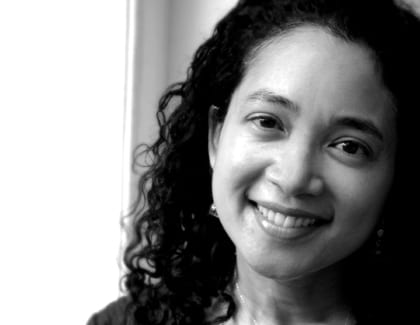On location
Film studies professor Fatimah Tobing Rony makes a movie in Indonesia

Film studies professors often find themselves explaining to people outside the humanities that they don’t make films – they study them. Yet Fatimah Tobing Rony, associate professor of film and media studies, does both.
Rony spent the summer in Indonesia, working on her first feature-length narrative film, “Love and Cannibalism.”
“[It’s] about a Sumatran woman living in the United States who goes back to her grandmother’s village in Sumatra to make a film about cannibalism,” Rony says. She has been developing the project for two years, and has now put finishing touches on the script, finalized the budget, scouted locations and begun selecting cast and crew, all of whom are Indonesian.
Rony, who has a doctorate in art history from Yale University and a master’s in directing and production from UCLA, has managed to bridge the worlds of film and academia. “Love and Cannibalism” is her fourth film project in six years. Her first book,The Third Eye: Race, Cinema and Ethnographic Spectacle, won the Society for Cinema and Media Studies’ award for outstanding scholarship. She is currently working on another book.
“At first I thought making a film and doing scholarship on film is like having a wife and a mistress at the same time. Neither one is happy,” jokes Rony. “It’s not something I would recommend to other people. You do both because you have to.” She had to postpone work on “Love and Cannibalism” to serve as department chair in 2005-06.
“Love and Cannibalism” will be shot in Java and Sumatra in summer 2007, with completion scheduled for early 2008. It will screen in theaters in Indonesia, Malaysia, the U.S. and in international film festivals, and will be released on DVD. It’s the first feature film to portray the “wildly beautiful” land of Sumatra and the Batak people, Rony says. She hopes it will offer a new perspective on the region and its indigenous inhabitants.